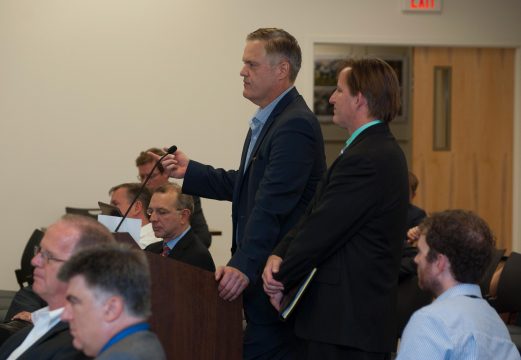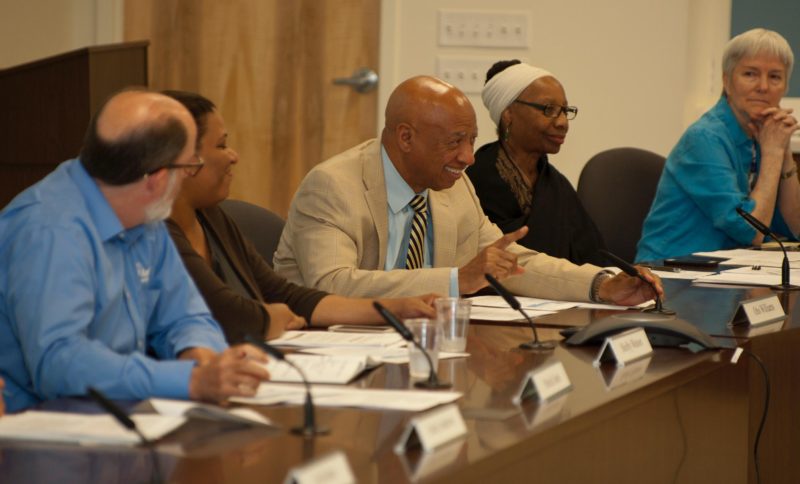SAINT LOUIS – As the Property Assessed Clean Energy Program (PACE) begins to take off in Missouri, St. Louis’ Set the PACE Clean Energy Development Board (CEDB) is moving carefully to launch an expanded program. Set the PACE, the state’s only clean energy development board sponsored by a major municipality, is currently reviewing projects.
The meeting showed both the promise of the program and why prudent policy makers and administrators are putting an emphasis on proper structures and safeguards in the program before completing funding for projects.
“We are excited to see these projects brought to a place where we can offer preliminary approval,” said board chairman Patrick Justis. “I am looking forward to seeing jobs created, and the positive environmental impacts.”
The board met Wednesday to not only review three projects, but it hopes to include energy saving plans within their larger redevelopment plans and also set a timeline to finalize their application and future approval processes.
The CEDB and the administrator permitted the preliminary approvals of three projects based on representations from the developers that the projects were funded and a delay in CEDB approval could jeopardize their imminent closing.

“We have been developing new policies and procedures, standardizing our program documents which will be used for all future PACE projects both commercial and residential, updating our marketing materials, website, and completing a new Program Manual”, said Set the PACE program administrator Byron DeLear. “Our proposed date to begin the relaunch of commercial PACE, Sept. 15, 2016. The CEDB and the administrator permitted the preliminary approvals of three projects based on representations from the developers that the projects were funded and a delay in CEDB approval could jeopardize their imminent closing.”
“The interim approval process provides the developers comfort that final approval will occur if all of the conditions are met to establish the basis for CEDB findings required under the statute”, said DeLear
The projects which were given a preliminary yellow light to utilize the PACE program were:
- 705 Olive a restoration project submitted by Amrit Gill which would include $8 million in PACE funding and create 200 jobs.
- 634 North Grand a redevelopment plan submitted by The Lawrence Group which would include $9.6 million in PACE funding and create 100 jobs.
- 300 North Front Street a restoration project submitted by Joseph Gillespie with 200 STL Holdings to include $20 million in PACE funding and create more than 200 jobs.
What exactly is the PACE program?
The PACE statute was enacted in 2010 and provides political subdivisions the ability to appoint clean energy development boards like the one chaired by Justis in the City of St. Louis. The clean energy development boards then become their own independent political subdivisions.
“The PACE program allows property owners to finance energy friendly improvements to their property by placing them on their property tax assessment. PACE allows for 100% financing and allows the payments to be spread out for up to 20 years. The assessments are covered as liens on the property”, said DeLear.
Optimistic but prudent formation of program standards
While the three properties were given a preliminary approvals from the board the actual resolutions the board passed had several conditions the applicants will have to meet before executing an assessment contract.
“We are going to be very cautious with our initial projects to ensure that our board sets standards that will be in place for a long time, and that approves several successful PACE projects,” said Justis.
The PACE statute allowing for the board’s formation gives a unique and very powerful ability to place project costs on a property tax bill. It also empowers the board to issue and sell bonds, defined as any note or similar instrument created by or on behalf of a clean energy development board. However, with those very unique and powerful abilities the statute imposes some specific responsibilities.
For example, the statute prohibits the board from entering into an assessment contract without making a finding that there are sufficient resources to complete the project and that the estimated economic benefit expected from the project during the financing period is equal to or greater than the cost of the project.
This means that it’s the board’s responsibility to collect all of the proper documentation, and legal opinions necessary to complete their due diligence to make sure the projects are financially sound, and that the structure of the transaction will comply with the statute. A CEDB is a political subdivision of the state that can sue or be sued.
The meeting showed both the program’s potential to be a key tool in development and the caution that boards like St. Louis’ Set the Pace have to employ to develop a sustainable and responsible program.
St. Louis is the state’s only city within a county and has an A1 bond rating from Moody’s.








